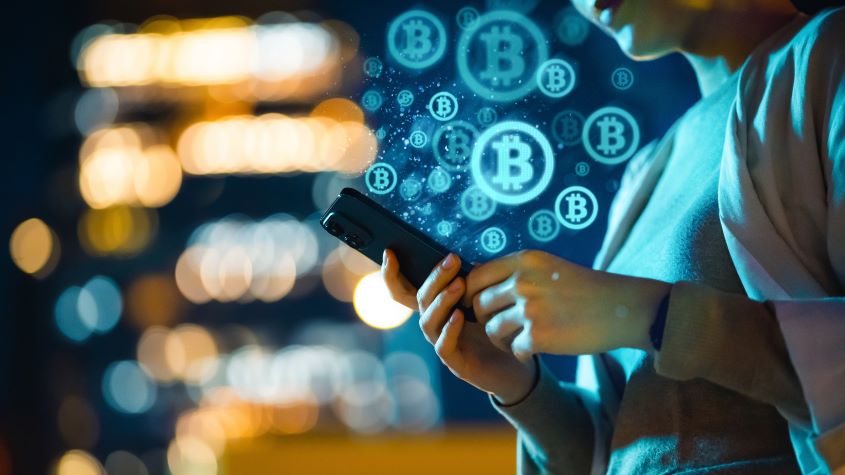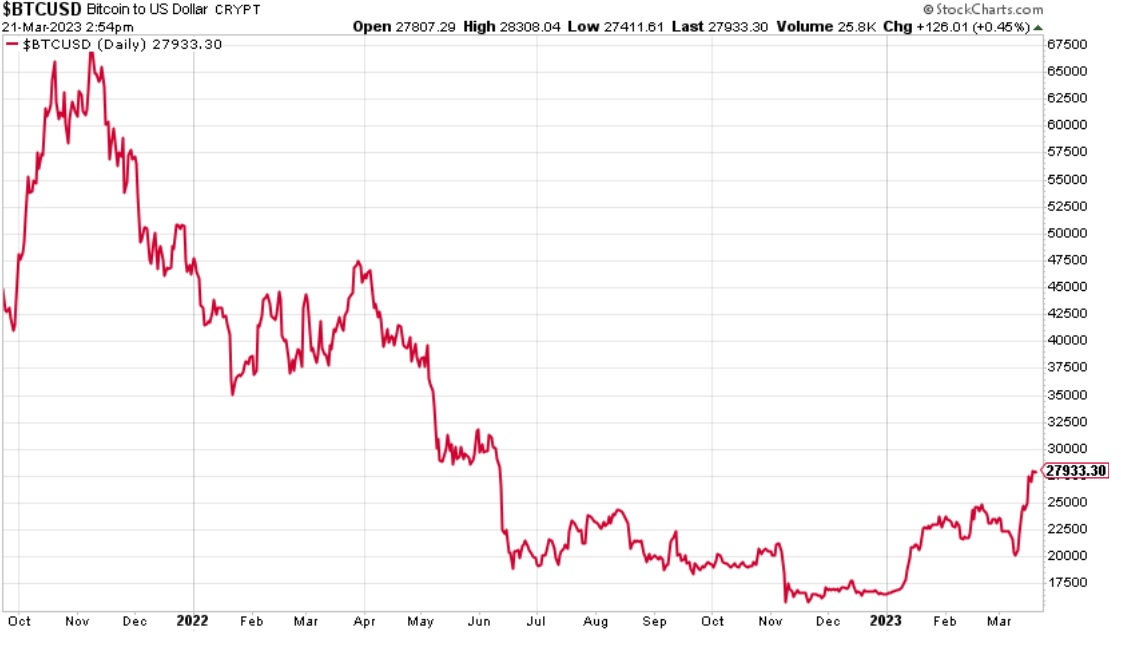Bank bailouts are bullish for bitcoin and gold
The collapse of Silicon Valley Bank and Credit Suisse has shaken investor confidence in the global financial system. Dominic Frisby explains what this means for gold and bitcoin


Get the latest financial news, insights and expert analysis from our award-winning MoneyWeek team, to help you understand what really matters when it comes to your finances.
You are now subscribed
Your newsletter sign-up was successful
Want to add more newsletters?

Twice daily
MoneyWeek
Get the latest financial news, insights and expert analysis from our award-winning MoneyWeek team, to help you understand what really matters when it comes to your finances.

Four times a week
Look After My Bills
Sign up to our free money-saving newsletter, filled with the latest news and expert advice to help you find the best tips and deals for managing your bills. Start saving today!
In your time bestriding the narrow world like a Colossus, you might have heard the term, “bearer asset” or “bearer instrument”.
That would be an asset that you take physical possession of - cash or bullion, for example - an asset that is effectively owned by whoever has possession of it, that can be transferred from one person to another by just handing it over.
The ownership of the asset is not registered with a central authority, so that makes it vulnerable to theft or loss, but it also means the asset is nobody else’s liability. Unlike money in the bank or a government bond, it carries no promise from a third party. The value of the asset is thus not dependent on the creditworthiness of any issuer or guarantor, but rather on the inherent value of the asset itself.
MoneyWeek
Subscribe to MoneyWeek today and get your first six magazine issues absolutely FREE

Sign up to Money Morning
Don't miss the latest investment and personal finances news, market analysis, plus money-saving tips with our free twice-daily newsletter
Don't miss the latest investment and personal finances news, market analysis, plus money-saving tips with our free twice-daily newsletter
So, in today’s interlinked financial world, a bearer asset becomes an asset outside the system.
Like Tottenham Hotspur, bearer assets have their strengths and their weaknesses. Their strength is that they are nobody else’s liability. Their weakness is that their liability is yours.
The two main bearer assets in today’s financial marketplace are gold and bitcoin.
Bitcoin rallies as investors seek safety
Bitcoin is not a physical asset of course. But the technological genius behind it means that it is a “digital bearer asset”. No such thing previously existed.
With bank runs, bail-outs and another banking crisis now upon us, both gold and bitcoin have suddenly fetched a bid. No surprise: they both are means to store value outside of the system. You don’t have to rely on third parties.
I thought, given everything, we should check in on both today.
Here’s bitcoin, which, at $28,000, has broken out to 9-month highs.

Is that a bullish, inverted head-and-shoulders pattern I see before me? I think so.
On that basis, what would the target be? The distance from the top of the head (around $15,000) to the shoulder line at c.$25,000 is $10,000 - so you would have a target of around $35,000, perhaps a little higher.
Some are even calling out for hyperbitcoinisation: a hypothetical scenario in which the widespread adoption of Bitcoin occurs so rapidly that its price rises dramatically and it becomes the dominant form of money in use.
In this scenario, Bitcoin would be widely accepted by merchants and individuals alike. The term "hyper" refers to the extreme and rapid level of adoption.
In a way, it is an inversion of hyperinflation. The fiat system would remain, it would necessarily collapse, it would just be overtaken and superseded by bitcoin.
There are many who believe hyperbitcoinisation is both inevitable and desirable. Bitcoin is better money than fiat. The traditional banking model is dysfunctional and reliant on constant bailouts.
One such advocate is billionaire Balaji Srinivasan, who has grown so concerned at the goings-on in US banking, he has made a million-dollar bet that bitcoin will hit $1 million by June 17.
The odds are against him. Some are suggesting he is just doing it for the attention. But to be fair to Balaji, he has a good track record spotting trends.
I’m a bitcoin bull, but maybe I lack ambition. I can see it getting to $35,000 or $40,000 by June. I’m not so sure about $1 million. But hey, I’ll take $1 million dollar bitcoin if it’s offered.
I’ve heard this kind of prediction before. You used to hear them all the time about silver. I’m not holding my breath.
My rather drab observation is that, after a miserable 2022, tech has suddenly caught a bid. Even Meta’s going up. Bond yields have fallen with the banking panic, and suddenly growth stocks look attractive again. Sorry to be so prosaic and unsensationalist.
Meanwhile, that other bearer asset, gold has also found a bid, and with it silver and platinum. Over the weekend, gold was flirting with $2,000.
The gold price surged after bank collapse
My buddy Josh Saul at the Pure Gold Company reports to me that, with the panic at Silicon Valley Bank, his company saw a 385% increase in new enquiries last weekend and a 274% increase in investors purchasing physical gold bars and coins last Monday, compared to its normal daily average. “One client said they are moving £16 million out of their current bank provider owing to fears of instability”, he says.
Volatility in the stock market isn’t helping either. “This year, we have also seen a 712% increase in people removing exposure to equities and cash in their pensions and SIPPs in order to purchase physical gold bullion in the same vehicle”.
Gold is now at all-time highs in almost all currencies, except the US dollar. What do new highs normally lead to?
In the short term, gold, breathing down the neck of $2,000, is a little overbought by most sentiment readings. The move has not been confirmed by the miners, which have been flat over the period. That suggests the spike is temporary.
But longer term I think it goes higher. I have long argued that everybody should have exposure to both gold and bitcoin in their portfolio, and it is crises like this one that demonstrate why.
Few people realise that by keeping your money in a bank, you are lending the bank money. The difference between money and credit has become conflated, along with many other things in this mad world. Even Switzerland no longer looks safe.
All the same arguments we heard in 2008 are coming back. The nature of money and banking lies at the centre of these arguments.
In 2008 there was a chance to address and put right the fundamental flaws in the system. It was not taken. Bail-outs brushed the problems under the carpet and left them for another day.
The free market meanwhile came out with an alternative, bitcoin. It is now a trillion-dollar economy, and there are no bailouts. With each collapse - there have been plenty and there will be plenty more - the system gets stronger.
But traditional banking, however, the more you bail out the system, the more precarious it becomes. You can’t take the risk out of a market. Without risk, you have no market. With risk comes responsibility.
Don’t blame the players. It’s the game that’s at fault.
This article was first published in MoneyWeek's magazine. Enjoy exclusive early access to news, opinion and analysis from our team of financial experts with a MoneyWeek subscription.
Get the latest financial news, insights and expert analysis from our award-winning MoneyWeek team, to help you understand what really matters when it comes to your finances.

-
 How should a good Catholic invest? Like the Vatican’s new stock index, it seems
How should a good Catholic invest? Like the Vatican’s new stock index, it seemsThe Vatican Bank has launched its first-ever stock index, championing companies that align with “Catholic principles”. But how well would it perform?
-
 The most single-friendly areas to buy a property
The most single-friendly areas to buy a propertyThere can be a single premium when it comes to getting on the property ladder but Zoopla has identified parts of the UK that remain affordable if you aren’t coupled-up
-
 Three key winners from the AI boom and beyond
Three key winners from the AI boom and beyondJames Harries of the Trojan Global Income Fund picks three promising stocks that transcend the hype of the AI boom
-
 RTX Corporation is a strong player in a growth market
RTX Corporation is a strong player in a growth marketRTX Corporation’s order backlog means investors can look forward to years of rising profits
-
 Profit from MSCI – the backbone of finance
Profit from MSCI – the backbone of financeAs an index provider, MSCI is a key part of the global financial system. Its shares look cheap
-
 'AI is the real deal – it will change our world in more ways than we can imagine'
'AI is the real deal – it will change our world in more ways than we can imagine'Interview Rob Arnott of Research Affiliates talks to Andrew Van Sickle about the AI bubble, the impact of tariffs on inflation and the outlook for gold and China
-
 Should investors join the rush for venture-capital trusts?
Should investors join the rush for venture-capital trusts?Opinion Investors hoping to buy into venture-capital trusts before the end of the tax year may need to move quickly, says David Prosser
-
 Food and drinks giants seek an image makeover – here's what they're doing
Food and drinks giants seek an image makeover – here's what they're doingThe global food and drink industry is having to change pace to retain its famous appeal for defensive investors. Who will be the winners?
-
 Barings Emerging Europe trust bounces back from Russia woes
Barings Emerging Europe trust bounces back from Russia woesBarings Emerging Europe trust has added the Middle East and Africa to its mandate, delivering a strong recovery, says Max King
-
 How a dovish Federal Reserve could affect you
How a dovish Federal Reserve could affect youTrump’s pick for the US Federal Reserve is not so much of a yes-man as his rival, but interest rates will still come down quickly, says Cris Sholto Heaton